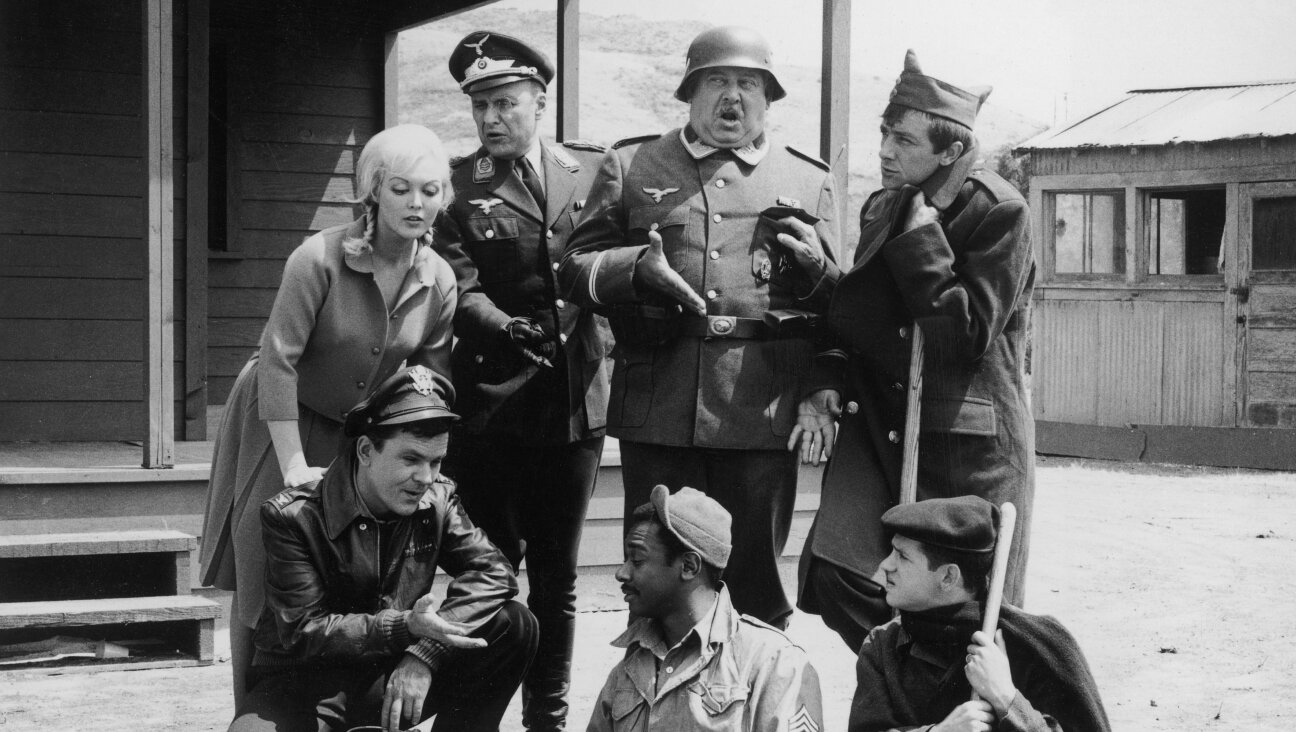Playwright Kenneth Lonergan’s Bible Belt Clash of Catholic Guilt and Jewish Anxiety

Image by Doug Hamilton
There’s a lesson in Kenneth Lonergan’s new play “Hold On To Me Darling,” which opened on Monday, March 14 at the Atlantic Theater Company. But I kind of doubt it’s the lesson the author intended. Lonergan is one of my favorite playwrights, which isn’t to say that he’s the author of my favorite plays. Like the erudite, lovable losers who populate his work, he’s a writer you want to root for even when he’s in the process of f—king everything up.
At his best — in the film “You Can Count on Me” and the plays “This Is Our Youth” and “Lobby Hero” — Lonergan conveys the poetic aspirations and romantic yearnings of seemingly ordinary folks, the characters who would play supporting roles in other authors’ scripts. And his disarming empathy and knack for comic dialogue have managed to elevate even his least successful work, i.e., the endearing but overwrought 2009 melodrama “The Starry Messenger” and the famously finished-in-2005-but-not-released-until-2011 film “Margaret,” which, yes, was sporadically engaging and insightful but, even in its director’s cut, not exactly the “thwarted masterpiece” The New York Times Magazine claimed it was.
In his plays and screenplays, Lonergan blends Catholic guilt and Jewish anxiety, expertly deconstructing the lives of characters who are tremendously self-conscious yet without being sufficiently self-aware. Which is to say that Lonergan is a New Yorker — seemingly most comfortable on the Upper West Side where he was raised as the child of one Jewish and one Irish-Catholic parent.
So, it’s hard to say but tempting to guess why this author was possessed to write a comedy about a phenomenally successful country-and-western crossover artist and movie star who, after the death of his domineering mother, decides to chuck in the trappings of wealth and fame in exchange for a good, honest life running a feed store in his hometown of Beaumont, Tennessee. How best to explain why the playwright of “This Is Our Youth” — that hilarious yet devastating take on the doomed, aimless lives of privileged, Upper West Side Jewish kids — chose to write of the inner turmoil of one “Strings” McCrane, who finds himself leaving his tabloid starlet girlfriend, then choosing between a seemingly straight-talkin’ but ultimately connivin’ Kansas City massage therapist at a hotel and a Tennessee kindergarten teacher who also happens to be his second cousin.
Could the play have been inspired by the author’s fascination with country music? By a lurid fantasy that took place during a hotel room rubdown? By a desire to cross over to mainstream success with characters who live outside the 10024 zip code? To present Lonergan’s own struggles with artistic achievement and personal integrity in a less familiar context? To bring life to an old, discarded project? It seems worth noting that, though the show at the Atlantic is a world premiere, the copyright date on the script is 2004.
Whatever the reason, even with nimble direction by Neil Pepe, a really fun, rotating set designed by Walt Spangler and a terrific ensemble cast — the show remains unconvincing in its flyover milieu. True, despite a nearly three-hour running time, “Hold On To Me Darling” is rarely dull and sometimes quite funny (Lonergan was, after all, the screenwriter of “Analyze This”). But the predicament of Strings McCrane feels no more believable than his name, which sounds more like a character in a “Quick Draw McGraw” cartoon than the biggest crossover star since Elvis. Tim Olyphant relies on his considerable charisma to make sense of McCrane’s contradictory impulses, while Jenn Lyon and Adelaide Clemens, playing the women in McCrane’s life, do terrific work with characters who seemed to have been written respectively with bitterness and condescension.
But unfortunately, the play doesn’t quite cohere, never quite chooses between earnestness and satire; it veers awkwardly from light and quippy comedy to a lovely and heartfelt denouement that feels mostly unearned.
At times, Lonergan’s play seems to be propounding a “You can’t go home again” sort of message, but it’s ultimately both more complicated and confused than that. For Strings McCrane, who can live either a shallow life in Hollywood or an unsatisfying one in Tennessee, each in the company of women who won’t measure up to his fantasies, it seems that he’ll be doomed no matter which he chooses. Maybe that’s how the playwright views all of our lives. As for Lonergan, a talented New York writer out of his element in Beaumont, Tennessee, the lesson is a simpler one — sometimes going home is your best option.
Recently, Amazon spent $10 million to acquire the writer’s next project “Manchester by the Sea,” a small film about grief and family set in New England. I’ll be looking forward to that one.
Adam Langer is the Forward’s culture editor. Twitter @Langer_Adam
A message from our Publisher & CEO Rachel Fishman Feddersen

I hope you appreciated this article. Before you go, I’d like to ask you to please support the Forward’s award-winning, nonprofit journalism during this critical time.
We’ve set a goal to raise $260,000 by December 31. That’s an ambitious goal, but one that will give us the resources we need to invest in the high quality news, opinion, analysis and cultural coverage that isn’t available anywhere else.
If you feel inspired to make an impact, now is the time to give something back. Join us as a member at your most generous level.
— Rachel Fishman Feddersen, Publisher and CEO
























